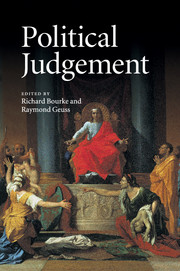Book contents
- Frontmatter
- Contents
- List of contributors
- Acknowledgements
- Introduction
- Part I The character of political judgement
- Part II Trust, judgement and consent
- 4 On trusting the judgement of our rulers
- 5 Adam Smith's history of law and government as political theory
- 6 Marxism in translation: critical reflections on Indian radical thought
- Part III Rationality and judgement
- Part IV Democracy and modern political judgement
- Bibliography of the works of John Dunn
- Index
4 - On trusting the judgement of our rulers
from Part II - Trust, judgement and consent
Published online by Cambridge University Press: 26 December 2009
- Frontmatter
- Contents
- List of contributors
- Acknowledgements
- Introduction
- Part I The character of political judgement
- Part II Trust, judgement and consent
- 4 On trusting the judgement of our rulers
- 5 Adam Smith's history of law and government as political theory
- 6 Marxism in translation: critical reflections on Indian radical thought
- Part III Rationality and judgement
- Part IV Democracy and modern political judgement
- Bibliography of the works of John Dunn
- Index
Summary
John Dunn has not only been one of the leading interpreters of John Locke's political theory in our time; he has also become an increasingly deep admirer of what he describes as the soundness and sober realism of Locke's political stance. Dunn's strong sense that Locke has something of vital importance to tell us here and now was by no means his initial reaction to the Two Treatises of Government. When in 1969 he published his classic monograph, The Political Thought of John Locke, he declared in his Preface that ‘I simply cannot conceive of constructing an analysis of any issue in contemporary political theory around the affirmation or negation of anything which Locke says about political matters.’ Dunn had already begun to reconsider this verdict some time before he formally recanted it in an essay of 1990 entitled ‘What Is Living and What Is Dead in the Political Theory of John Locke’, in which he characterised his original response as ‘peculiarly ill-considered’. He had already maintained in his Introduction to Rethinking Modern Political Theory in 1985 that Locke's view of political power ‘has a trenchancy and a relevance’ that are in some respects ‘unmatched by any other major political thinker’, and in the same collection of essays he went so far as to add that we have good reason to treat Locke's conception of political philosophy as exemplary for our times.
- Type
- Chapter
- Information
- Political JudgementEssays for John Dunn, pp. 113 - 130Publisher: Cambridge University PressPrint publication year: 2009
- 2
- Cited by



